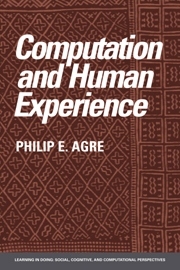Book contents
- Frontmatter
- Contents
- Preface
- 1 Introduction
- 2 Metaphor in practice
- 3 Machinery and dynamics
- 4 Abstraction and implementation
- 5 The digital abstraction
- 6 Dependency maintenance
- 7 Rule system
- 8 Planning and improvisation
- 9 Running arguments
- 10 Experiments with running arguments
- 11 Representation and indexicality
- 12 Deictic representation
- 13 Pengi
- 14 Conclusion
- Notes
- References
- Author index
- Subject index
Preface
Published online by Cambridge University Press: 07 December 2009
- Frontmatter
- Contents
- Preface
- 1 Introduction
- 2 Metaphor in practice
- 3 Machinery and dynamics
- 4 Abstraction and implementation
- 5 The digital abstraction
- 6 Dependency maintenance
- 7 Rule system
- 8 Planning and improvisation
- 9 Running arguments
- 10 Experiments with running arguments
- 11 Representation and indexicality
- 12 Deictic representation
- 13 Pengi
- 14 Conclusion
- Notes
- References
- Author index
- Subject index
Summary
Artificial intelligence has aroused debate ever since Hubert Dreyfus wrote his controversial report, Alchemy and Artificial Intelligence (1965). Philosophers and social scientists who have been influenced by European critical thought have often viewed AI models through philosophical lenses and found them scandalously bad. AI people, for their part, often do not recognize their methods in the interpretations of the critics, and as a result they have sometimes regarded their critics as practically insane.
When I first became an AI person myself, I paid little attention to the critics. As I tried to construct AI models that seemed true to my own experience of everyday life, however, I gradually concluded that the critics were right. I now believe that the substantive analysis of human experience in the main traditions of AI research is profoundly mistaken. My reasons for believing this, however, differ somewhat from those of Dreyfus and other critics, such as Winograd and Flores (1986). Whereas their concerns focus on the analysis of language and rules, my own concerns focus on the analysis of action and representation, and on the larger question of human beings' relationships to the physical environment in which they conduct their daily lives. I believe that people are intimately involved in the world around them and that the epistemological isolation that Descartes took for granted is untenable. This position has been argued at great length by philosophers such as Heidegger and Merleau-Ponty; I wish to argue it technologically.
This is a formidable task, given that many AI people deny that such arguments have any relevance to their research.
Information
- Type
- Chapter
- Information
- Computation and Human Experience , pp. xiii - xviiiPublisher: Cambridge University PressPrint publication year: 1997
